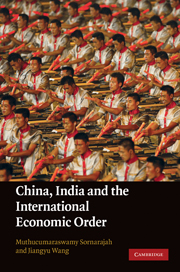Book contents
- Frontmatter
- Contents
- Notes on contributors
- Preface
- Introduction and overview
- PART I China, India and the global trade system
- 1 The WTO and development policy in China and India
- 2 China, India and developing countries in the WTO
- 3 China–India cooperation, South–South coalition and the new international economic order
- 4 India, China and foreign investment
- 5 China, India and WTO Law
- 6 China, India and the WTO dispute settlement system
- 7 China, India and dispute settlement in the WTO and RTAs
- 8 China, India and global outsourcing of services under GATS
- 9 International dispute settlement
- PART II China, India and regional economic integration in Asia
- PART III Law and development in China and India: Domestic issues
- Index
- References
6 - China, India and the WTO dispute settlement system
Towards an interpretative strategy
from PART I - China, India and the global trade system
Published online by Cambridge University Press: 03 May 2011
- Frontmatter
- Contents
- Notes on contributors
- Preface
- Introduction and overview
- PART I China, India and the global trade system
- 1 The WTO and development policy in China and India
- 2 China, India and developing countries in the WTO
- 3 China–India cooperation, South–South coalition and the new international economic order
- 4 India, China and foreign investment
- 5 China, India and WTO Law
- 6 China, India and the WTO dispute settlement system
- 7 China, India and dispute settlement in the WTO and RTAs
- 8 China, India and global outsourcing of services under GATS
- 9 International dispute settlement
- PART II China, India and regional economic integration in Asia
- PART III Law and development in China and India: Domestic issues
- Index
- References
Summary
Introduction
The WTO established a rule-oriented dispute settlement system (DSS) to resolve disputes between member states. There is today a consensus that the WTO DSS has worked well; it is seen to have worked to the advantage of both developed and developing countries. Equally there is agreement that there is much room for improvement. Keeping this sentiment in view the Doha Ministerial Declaration agreed ‘to negotiations on improvements and clarifications of the Dispute Settlement Understanding’. The review of DSS, yet to be concluded, has seen a large number of proposals from developing countries. Among them India has been relatively active in advancing proposals of reform of Understanding on Rules and Procedures Governing the Settlement of Disputes (DSU). It has relied on its reasonably extensive experience with the WTO DSS to advance these proposals; India has to date been complainant in 18 cases, respondent in 20 cases and a third party in 51 cases. The Indian proposals, advanced together with a number of other developing countries, have pertained to, among others, the term of appointment of Appellate Body (AB) members, litigation costs, special and differential treatment, compliance with decisions of the dispute settlement body (DSB), and the issue of amicus curiae briefs. China has had, as compared with India, a more limited experience with the WTO DSS as it acceded to WTO only in 2001; it has to date been complainant in 7 cases, respondent in 17 cases and third party in 62 cases.
- Type
- Chapter
- Information
- China, India and the International Economic Order , pp. 217 - 249Publisher: Cambridge University PressPrint publication year: 2010
References
- 2
- Cited by

